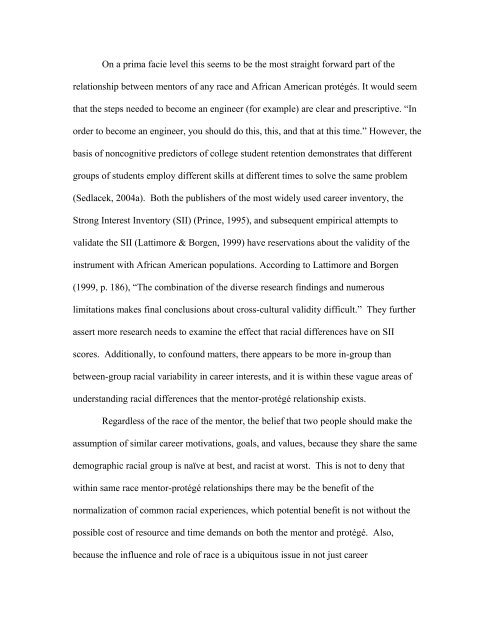Mentoring in Academia: Considerations for ... - Dr. William Sedlacek
Mentoring in Academia: Considerations for ... - Dr. William Sedlacek
Mentoring in Academia: Considerations for ... - Dr. William Sedlacek
Create successful ePaper yourself
Turn your PDF publications into a flip-book with our unique Google optimized e-Paper software.
On a prima facie level this seems to be the most straight <strong>for</strong>ward part of the<br />
relationship between mentors of any race and African American protégés. It would seem<br />
that the steps needed to become an eng<strong>in</strong>eer (<strong>for</strong> example) are clear and prescriptive. “In<br />
order to become an eng<strong>in</strong>eer, you should do this, this, and that at this time.” However, the<br />
basis of noncognitive predictors of college student retention demonstrates that different<br />
groups of students employ different skills at different times to solve the same problem<br />
(<strong>Sedlacek</strong>, 2004a). Both the publishers of the most widely used career <strong>in</strong>ventory, the<br />
Strong Interest Inventory (SII) (Pr<strong>in</strong>ce, 1995), and subsequent empirical attempts to<br />
validate the SII (Lattimore & Borgen, 1999) have reservations about the validity of the<br />
<strong>in</strong>strument with African American populations. Accord<strong>in</strong>g to Lattimore and Borgen<br />
(1999, p. 186), “The comb<strong>in</strong>ation of the diverse research f<strong>in</strong>d<strong>in</strong>gs and numerous<br />
limitations makes f<strong>in</strong>al conclusions about cross-cultural validity difficult.” They further<br />
assert more research needs to exam<strong>in</strong>e the effect that racial differences have on SII<br />
scores. Additionally, to confound matters, there appears to be more <strong>in</strong>-group than<br />
between-group racial variability <strong>in</strong> career <strong>in</strong>terests, and it is with<strong>in</strong> these vague areas of<br />
understand<strong>in</strong>g racial differences that the mentor-protégé relationship exists.<br />
Regardless of the race of the mentor, the belief that two people should make the<br />
assumption of similar career motivations, goals, and values, because they share the same<br />
demographic racial group is naïve at best, and racist at worst. This is not to deny that<br />
with<strong>in</strong> same race mentor-protégé relationships there may be the benefit of the<br />
normalization of common racial experiences, which potential benefit is not without the<br />
possible cost of resource and time demands on both the mentor and protégé. Also,<br />
because the <strong>in</strong>fluence and role of race is a ubiquitous issue <strong>in</strong> not just career


